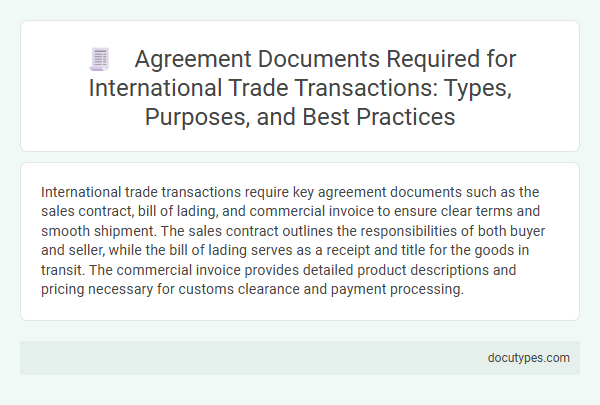International trade transactions require key agreement documents such as the sales contract, bill of lading, and commercial invoice to ensure clear terms and smooth shipment. The sales contract outlines the responsibilities of both buyer and seller, while the bill of lading serves as a receipt and title for the goods in transit. The commercial invoice provides detailed product descriptions and pricing necessary for customs clearance and payment processing.
Introduction to Agreement Documents in International Trade
| Introduction to Agreement Documents in International Trade | |
|---|---|
| Definition | Agreement documents in international trade are formal contracts that outline the terms and conditions between parties involved in cross-border transactions. These documents establish legal obligations, responsibilities, and expectations for buyers, sellers, and intermediaries. |
| Purpose | These documents ensure clarity, reduce risks, and provide a framework for dispute resolution. They protect interests, confirm delivery and payment terms, and comply with international laws and regulations. |
| Key Agreement Documents |
|
| Importance in Trade | Proper agreement documents support smooth customs clearance, secure payment processing, and accurate shipment handling. They are essential for compliance with trade laws and standards set by organizations such as the International Chamber of Commerce (ICC). |
| Compliance Requirements | Documents must align with Incoterms(r), national export-import regulations, and international trade agreements to avoid delays, penalties, or legal disputes. |
Key Types of Agreement Documents in Global Transactions
International trade transactions require several key agreement documents to ensure clear terms and legal compliance between parties across borders. These documents outline the responsibilities, rights, and obligations, reducing risks in global commerce.
The primary agreement documents include the Sales Contract, which details the terms of sale such as price, quantity, and delivery conditions. The Letter of Credit guarantees payment from the buyer's bank to the seller upon fulfilling contract terms. The Bill of Lading serves as proof of shipment and title of goods during transportation.
Essential Purposes of Trade Agreement Documents
Trade agreement documents establish the legal framework necessary for smooth international transactions, ensuring both parties understand their obligations. Essential documents include contracts, letters of credit, and shipping documents, each serving specific purposes such as payment assurance, goods description, and delivery terms. Understanding these documents protects your interests and facilitates compliance with trade regulations worldwide.
Sales Contracts: Structure and Significance
Which agreement documents are essential for international trade transactions involving sales contracts? Sales contracts form the backbone of international trade agreements by clearly defining terms, conditions, and obligations between buyers and sellers. They ensure legal protection and facilitate smooth execution of cross-border sales activities.
Commercial Invoices and Their Legal Importance
Commercial invoices are essential documents in international trade transactions, serving as the primary proof of sale between the exporter and importer. They detail the goods, quantities, prices, and payment terms, facilitating customs clearance and payment processing.
Legally, commercial invoices establish the contractual obligations of each party and are often required to resolve disputes or claims. They also play a critical role in complying with international trade regulations and tax authorities.
Bills of Lading: Roles and Requirements
Bills of lading serve as essential agreement documents in international trade transactions, acting as a contract between the shipper and carrier. They outline the terms of carriage, specify the goods transported, and function as a receipt and document of title. You must ensure the accuracy and proper issuance of bills of lading to facilitate smooth customs clearance and secure payment processes.
Letters of Credit: Securing International Payments
Letters of Credit play a crucial role in securing payments in international trade transactions by acting as a reliable financial guarantee between buyers and sellers. These documents ensure that exporters receive payment once the specified terms and conditions are fulfilled.
- Issuance by Banks - Letters of Credit are issued by banks on behalf of the buyer, assuring the seller of payment upon compliance with the contract terms.
- Documentary Compliance - Payment is contingent on the presentation and verification of required documents such as invoices, shipping documents, and certificates.
- Risk Mitigation - This agreement document reduces risks related to payment defaults and currency fluctuations in cross-border trade.
Letters of Credit are essential agreement documents that facilitate secure and trustworthy international trade payments.
Certificate of Origin: Necessity and Compliance
The Certificate of Origin is a crucial document in international trade, proving the product's country of manufacture. Compliance with this certificate ensures eligibility for preferential tariffs and adherence to trade regulations.
- Proof of origin - The Certificate of Origin verifies the exact country where the goods were produced or manufactured.
- Tariff benefits - It allows importers to claim reduced or zero tariffs under trade agreements based on the product's origin.
- Customs compliance - Accurate completion of this document is mandatory to meet customs requirements and avoid shipment delays or penalties.
Best Practices for Managing Trade Agreement Documents
Proper management of trade agreement documents is essential for smooth international trade transactions. Identifying and maintaining key documents ensures compliance and reduces risks.
- Clearly Identify Required Documents - Essential documents include sales contracts, letters of credit, bills of lading, and customs declarations to validate trade terms and shipment details.
- Implement Robust Document Storage Systems - Use secure digital platforms for organizing and accessing trade agreements to improve efficiency and safeguard sensitive information.
- Regularly Review and Update Agreements - Continuously monitor and revise documents to reflect regulatory changes and evolving trade conditions for sustained compliance.
Which Agreement Documents Are Required for International Trade Transactions? Infographic

